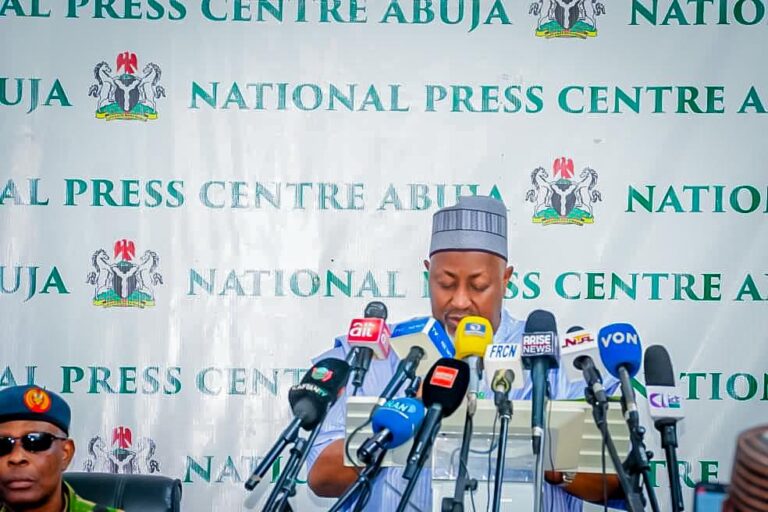In a bold affirmation of Nigeria’s ongoing security transformation, the Honourable Minister of Defence, Mohammed Badaru Abubakar, has outlined the achievements of his ministry under the current administration, projecting confidence in the nation’s defence trajectory as 2025 unfolds. Addressing the media and key stakeholders in Abuja, the minister emphasized Nigeria’s unwavering commitment to securing its territorial integrity and countering threats both at home and across its borders.
According to the minister, the past two years have witnessed notable progress in strengthening national defence systems, reinforcing regional cooperation, and enhancing international security partnerships. As Africa’s largest economy and most populous country, Nigeria continues to play a central role in the continent’s stability, and this role, he noted, is becoming increasingly critical in the face of evolving transnational threats such as terrorism, cybercrime, and organized criminal syndicates.
Badaru stressed that these complex challenges are not unique to Nigeria but are deeply embedded within broader global and regional security dynamics. Citing the deteriorating security situation in the Sahel, he pointed to how the emergence of the Alliance of Sahel States—an alliance between Mali, Niger, and Burkina Faso following their withdrawal from ECOWAS—has added a new layer of tension to West African geopolitics. These developments, the minister warned, carry serious implications for Nigeria, especially across its northern border, necessitating a strategic recalibration of defence policies and border management frameworks.
The Defence Minister also reaffirmed Nigeria’s commitment to multilateral cooperation, even as the country adjusts to shifting regional alliances. The government, he said, is carefully balancing diplomacy with decisive military readiness to prevent the spillover of jihadist insurgencies into Nigerian territory. Enhanced surveillance, improved intelligence gathering, and targeted military deployments have been part of a renewed push to safeguard Nigeria’s northern flanks from external threats.
The security situation around the Lake Chad Basin remains a top concern, as extremist groups like Boko Haram and the Islamic State West Africa Province (ISWAP) persist in their disruptive campaigns. However, Badaru disclosed that in collaboration with the Multinational Joint Task Force (MNJTF)—comprising Nigeria, Niger, Chad, and Cameroon—the Nigerian military has dealt significant blows to insurgents operating in the region. Several high-profile terrorists have been neutralized, and previously lost territories reclaimed in the northeast, reflecting sustained military gains under the current administration.
In addition to regional threats, Nigeria continues to confront internal security crises. From banditry and kidnapping in the Northwest to ethnic tensions and farmer-herder conflicts in the North-central region, the challenges are diverse and often rooted in long-standing socio-political and economic issues. The minister acknowledged that while President Bola Ahmed Tinubu’s administration has made determined efforts to meet its security promises since assuming office in 2023, the scale of insecurity requires more than just military intervention. It demands a holistic, national approach.
“We cannot win this war with bullets alone,” Badaru noted. “Our strategy must also win the hearts and minds of our people, promote good governance, and rebuild communities devastated by conflict.” He stressed that the Ministry of Defence is now operating with a broader lens, integrating non-kinetic solutions alongside conventional military action.
He further highlighted the role of poverty, porous borders, climate-induced displacement, and foreign influence in fuelling the current security challenges. In line with the President’s directive—summarized in his firm stance: “Enough is enough”—the ministry has ramped up coordination across all arms of security and defence, from intelligence sharing to civic engagement initiatives.
Among the key reforms and accomplishments, the minister listed the expansion of the Special Operations Forces (SOF), development of a framework to reduce reliance on foreign military equipment, and a comprehensive review of welfare policies for security personnel at the frontlines. He also spoke on the strategic partnerships with neighbouring countries on cross-border security, border control, and coordinated military and economic operations.
Efforts have also been made to enhance the capacity of Armed Forces of Nigeria (AFN) personnel, improve civil-military cooperation, and promote performance accountability through the deployment of an Electronic Content Management System (ECMS) and performance management frameworks for public service delivery.
To ensure transparency and public trust, the ministry has institutionalized regular engagement sessions with citizens and stakeholders to communicate government actions and receive feedback, reinforcing the administration’s commitment to democratic accountability in defence governance.
As Nigeria navigates its complex security landscape, Minister Badaru’s scorecard not only reflects progress but signals a more adaptive and strategic approach to national defence—one that integrates diplomacy, military precision, and socio-political reform. With 2025 underway, the Ministry of Defence appears poised to deliver on its mandate under the firm guidance of President Bola Ahmed Tinubu.
